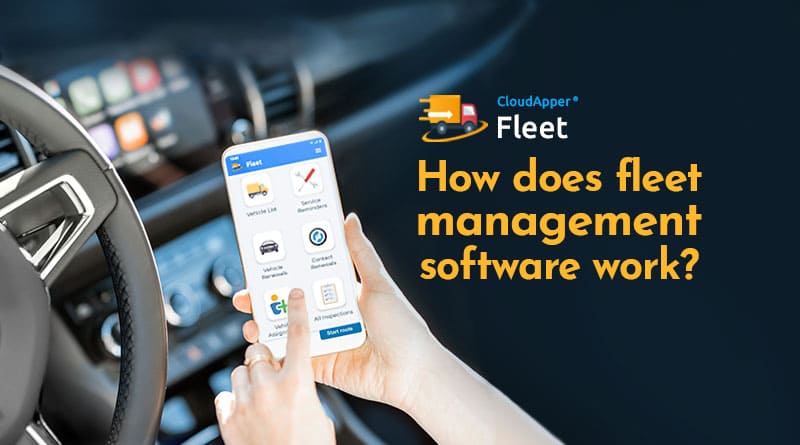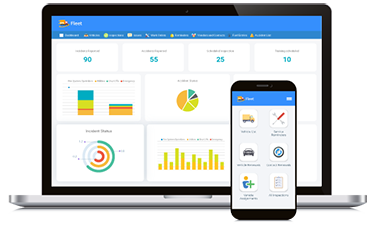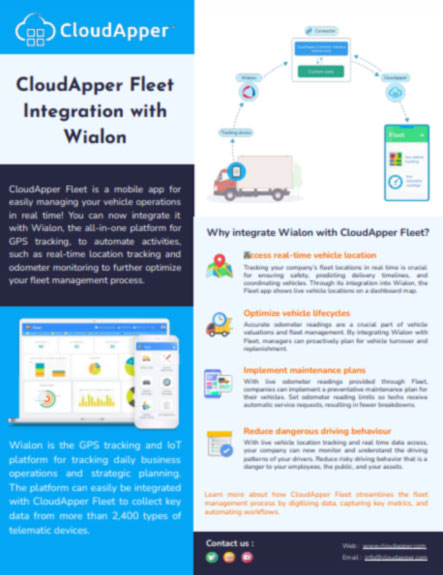Table of Contents
The 2019 Smart Fleet Management Market has been estimated at 525 billion dollars, according to a recent study on factual information and factors, and is estimated to be 900 billion by 2026. The report suggests that strict government regulations, increased use of Cloud-based solutions, increased IoT use and rising demand for big data analysis are key reasons for growth.
So, how does fleet management software work?
Simply put, the software that is involved in the coordination of commercial vehicles is fleet management software. The ultimate goal of fleet management solution is to enable companies to control the entire life cycle of the fleet so as to increase efficiency, cut costs, increase productivity, reduce risk and ensure compliance with the regulation of the government.
Work vehicles represent an enormous part of the economy and are somehow used in almost every industry. Fleet companies include transport companies, courier companies, sales, repair and service industries, utilities, public transportation, oil and gas transportation, and emergency services. Even if a company has no own fleet, it can probably rely on a fleet for some part of its supply chain and outsource this to a different company.
The components of fleet management
A fleet-management technology solution contains many components. In order to understand how does fleet management software work, some of these main components of fleet management software need to be discussed here:
-
Fleet Tracking
Geo-fencing is used by fleet tracking to monitor equipment cars, drivers, or equipment. It uses mobile data and cloud application technology to collect data in real-time, enabling fleet managers to immediately gain practical insight. Thus, a manager can know when the vehicle must be dispatched, where it is going, how far it has been, and when for example a vehicle returns.
Based on active tracking systems, businesses that want to set up a geofence, a default area on a map. This means that the fleet manager is notified if the vehicle arrives in or leaves the geofenced area.
-
Fleet Management
Fleet management software allows managers to have in one place all necessary information about the fleet. The database is effective to help organizations monitor everything from expenditures, drivers, customer updates, driver behavior, and fuel consumption. This database helps them keep track of everything. Some of those applications require a range of applications, but the data can be extracted from the overall database, making the administrative process much more efficient and fleet managers productive.
-
Fleet Maintenance
Since vehicles are one of a fleet manager’s major investments, a proactive maintenance approach is essential. Maintenance software, which is frequently included in fleet management solutions, enables organizations to plan and monitor vehicle maintenance and repair. They can also create purchase orders and send customers invoices via this platform. Moreover, other documents can be stored such as warranties, claims, provider details, and maintenance history.
By means of vehicle log management, fleet managers can automatically track journeys, miles, fuel, and engine hours in order to alert you when a vehicle is due to be repaired or serviced. This is also a strategic step because it can help them plan the most efficient and cost-effective way to use their assets, budget, and employees. Furthermore, the car’s ROI will increase thereafter.
Key features and advantages of fleet management software:
- Numerous administrative tasks such as the quotation, invoicing, identification and dispatch of drivers, cost management and customer information can be simplified or automated
- Fleet managers can monitor fuel consumption, inspect vehicles and drivers when fuel overuse occurs and monitor the driver’s behavior. This allows Fleet Managers to better manage the fuel fare. For example, managers can gain insights into idle times through driver conduct analysis, which can be a major source of fuel expenses
- Software for fleet management can also be equipped with workflow automation software, providing managers with regular maintenance and service records on the basis of data, kilometers, or user times. Managers can act before a vehicle shows signs of malfunction through maintenance planning monitoring
- Simplify how drivers in the field can communicate with an application via messages and orders. Furthermore, cars can provide feedback updates on the order and estimated arrival time.
- Enhanced data accuracy since drivers can enter data directly from the road, data are more accurate and can help to cut redundant fleet management database entries.
- In order to ensure that all information remains current and notifications of expiry dates are used, regulatory and legal conformity may be monitored better.
- All of this can help fleet managers to become a more strategic part of the business in general, helping to achieve budget and forecasting, sustainability, and major transformation management (such as dealing with changes as a result of the Covid-19 pandemic).
- Fleet management products are also integrated with software providers to ensure that other tasks, like ERP, payments, road optimization, and HR tasks are more seamless.
Fleet management software, overall, helps fleet managers in automating, optimizing, and eventually reducing costs. Ready to experience how does fleet management software work firsthand?
What is CloudApper AI Platform?
CloudApper AI is an advanced platform that enables organizations to integrate AI into their existing enterprise systems effortlessly, without the need for technical expertise, costly development, or upgrading the underlying infrastructure. By transforming legacy systems into AI-capable solutions, CloudApper allows companies to harness the power of Generative AI quickly and efficiently. This approach has been successfully implemented with leading systems like UKG, Workday, Oracle, Paradox, Amazon AWS Bedrock and can be applied across various industries, helping businesses enhance productivity, automate processes, and gain deeper insights without the usual complexities. With CloudApper AI, you can start experiencing the transformative benefits of AI today. Learn More

















